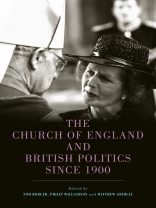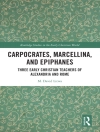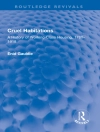Bringing together researchers in modern British religious, political, intellectual and social history, this volume considers the persistence of the Church’s public significance, despite its falling membership.
During the twentieth century, the relationship between the Church of England and the British state was transformed. The character and dynamics of the connections shifted as politics became more democratic and society more secular, as the role of the Crown and parliament in Church government was curtailed, and as the Christian foundations of secular law were weakened. Yet the increasing formal separation of Church and state was not accompanied by ecclesiastical disengagement from politics and government. Despite its falling membership, the Church of England continued – and continues – to wield influence on political life in Britain.
This volume of essays brings together researchers in modern British religious, political, intellectual and social history to consider the persistence of the Church’s public significance. The introduction reviews the developing literature on the relationships between the Church, the state and politics from 1900 to recent times. The essays which follow consider aspects of these complex intersections: in parliament, party politics and the parish; on the nature of the Church establishment and conceptionsof national identity; in religious and sexual education; on colonial and foreign policies; on race and the multi-faith society. In these various ways, the volume shows that pronouncements on a modern demise of ecclesiastical influence in political life have been premature.
TOM RODGER is an independent researcher based in British Columbia.
PHILIP WILLIAMSON is professor of modern history at Durham University.
MATTHEW GRIMLEY is associate professor in modern history at the University of Oxford and fellow and tutor at Merton College.
Contributors: Arthur Burns, Andrew Connell, Hannah Elias, Simon Green, Matthew Grimley, Daniel S. Loss, Stephen Parker and Rob Freathy, Laura Ramsey, Tom Rodger, Julia Stapleton, Sarah Stockwell, Peter Webster, and Philip Williamson.
Mục lục
Preface
Introduction: The Church of England, the British state and British politics during the twentieth century – Matthew Grimley
Introduction: The Church of England, the British state and British politics during the twentieth century – Philip A Williamson
The Politics of Church defense: Archbishop Davidson, the national church, and the ‘national interest’, c. 1900-1920 – Tom Rodger
Archbishops and the monarchy: leadership in British religion, 1900-2012 – Philip A Williamson
Ecclesiastical conservatism: Hensley Henson and Lord Hugh Cecil on Church, state and nation, c. 1900-1940 – Julia Stapleton
Hensley Henson, the Prayer Book controversy and the conservative case for disestablishment – S J D Green
Assembling an Anglican view of self-governing sexual citizenship, 1918-45 – Laura Ramsay
Politics in the parish: Joseph Needham at Thaxted, c. 1925-85 – Arthur Burns
Anglicans, reconstruction and democracy: the Cripps circle, 1939-52 – Matthew Grimley
Parliament and the law of the Church of England, 1945-74 – Peter Webster
The Church of England and religious education during the twentieth century – Stephen G. Parker and Rob Freathy
Spiritual authority in a ‘secular age’: the Lords Spiritual, c. 1950-80 – Tom Rodger
‘A sort of official duty to reconcile’: Archbishop Fisher, the Church of England and the politics of British decolonisation in East and Central Africa – Sarah Stockwell
A ‘baffling task’: Archbishop Fisher and the Suez Crisis – Andrew Connell
John Collins, Martin Luther King, Jr., and transnational networks of protest and resistance in the Church of England during the 1960s – Hannah Elias
The Church of England, minority religions and the making of communal pluralism – Daniel Loss
Giới thiệu về tác giả
TOM RODGER is an independent researcher based in British Columbia.












